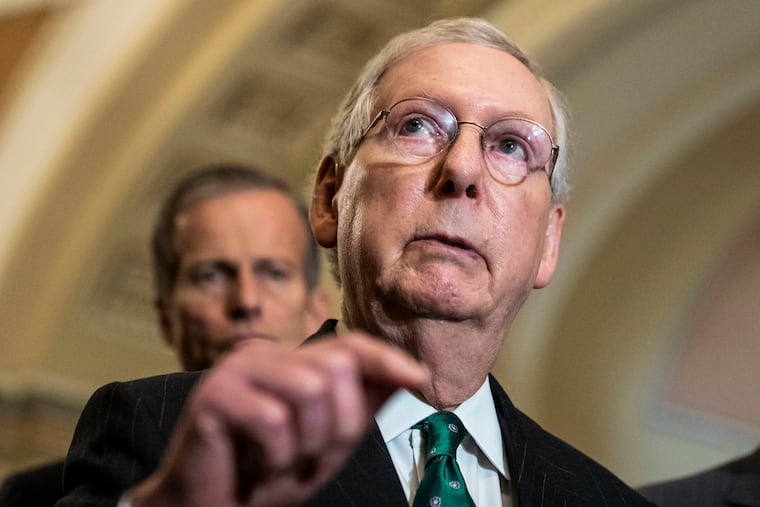Mitch McConnell could be the most consequential conservative leader of the century | Marc Thiessen
Not so long ago, it was tea party conservatives who were calling McConnell a traitor to the GOP. They owe him an apology.

WASHINGTON –This weekend, left-wing protesters accosted Senate Majority Leader Mitch McConnell in a Kentucky restaurant, yelling at him that he was a "traitor." Not so long ago, it was tea party conservatives who were calling McConnell a traitor to the GOP. They owe him an apology.
While President Trump deserves credit for making outstanding judicial nominations, long before Trump declared his candidacy, McConnell was laying the groundwork for a conservative transformation of the federal judiciary. It was, he told me in an interview last week, "entirely premeditated."
In 2013, Democrats had invoked the "nuclear option," eliminating the filibuster for all federal judicial appointments except the Supreme Court — allowing them to pack the federal circuit courts with left-wing Barack Obama appointees by simple majority. After Republicans won back control of the Senate in the 2014 midterms, McConnell put the brakes on the Democratic confirmation juggernaut — and then blocked Obama's nomination of Judge Merrick Garland to replace Justice Antonin Scalia, who had died during Obama's final year in office. Result? On Inauguration Day, Trump was presented with a slate of more than 100 judicial vacancies to fill, including a seat on the Supreme Court.
Democrats were so blinded by their anger over McConnell's tactics that they made an unforced error: When Trump nominated Neil M. Gorsuch — a judge of unquestioned qualification and temperament — to fill Scalia's seat, they decided to filibuster him. McConnell could not believe his luck. Some of his Republican colleagues had argued that, once in the majority, they should restore the judicial filibuster Democrats had eliminated — not extend it to Supreme Court nominations. But the Gorsuch filibuster changed their minds. "I argued to my people if this guy can't get 60 votes then nobody a Republican president nominates is going to get 60 votes," McConnell says. "That's what allowed me to get people who were reluctant and complaining about using the nuclear option four years earlier to do it."
This not only put Gorsuch on the high court but also paved the way for Brett M. Kavanaugh's confirmation. If Democrats had preserved the filibuster, Trump's nominee to replace Justice Anthony M. Kennedy, the court's swing vote, might not have made it. I asked McConnell whether he could have gotten Republicans to invoke the nuclear option for Kavanaugh. "It would have been a lot harder," he says. "I think in retrospect you can look back and say that was not a smart play on their part."
While the Supreme Court hears only about 80 cases a year, the federal appeals courts have final say on about 60,000 cases. And in just two years, McConnell's Republican majority has confirmed 29 circuit court judges, as well as 53 federal district court judges — a modern record. Today, nearly 1 in 6 circuit court judges have been confirmed by McConnell's Senate majority. As former Hillary Clinton adviser Ronald A. Klain complained, "Trump's judicial nominees will be deciding the scope of our civil liberties and the shape of civil rights laws in the year 2050 — and beyond."
Transforming the judiciary is not McConnell's only major conservative accomplishment, but he says it will be the most lasting. "I love the tax bill, but the '86 tax bill lasted four years before the political wind shifted," he says. "But there's not much you can do about a young man or woman who's a strict constructionist who goes on the court at 48 and stays there for 25 years. So, I think it's the most important thing we're doing, and I hope we're going to have the opportunity to do it for two more years."
If Republicans retain control of the Senate, he says, "we're going to fill every vacancy we possibly can with strict constructionists." Does that include another Supreme Court justice, if a vacancy comes up in a presidential election year? The tradition, McConnell explains, is that "if a Senate is of a different party than the president and a vacancy occurs in a presidential election year, it doesn't get filled." But what if the president and the Senate are of the same party? "Could you imagine … a majority in the Senate of the same party as the president saying 'no thank you'? I don't think that's likely to happen." So, is the "McConnell Rule" that when you have the White House and the votes in the Senate, you use them? "Yep," he says. "That's the way it's going to work. That's the way it's worked for 230 years."
The 21st century is still young. But so far, Mitch McConnell is arguably the most consequential conservative leader of the century. And he may not be done yet. The voters will decide in two weeks.
Marc Thiessen writes a twice-weekly column for the Washington Post on foreign and domestic policy. @marcthiessen